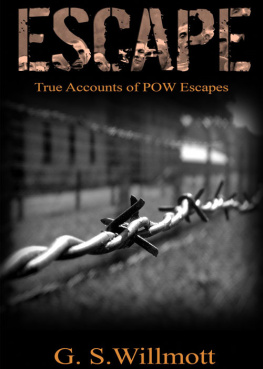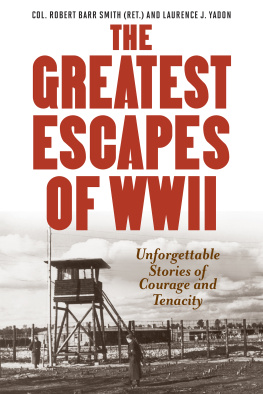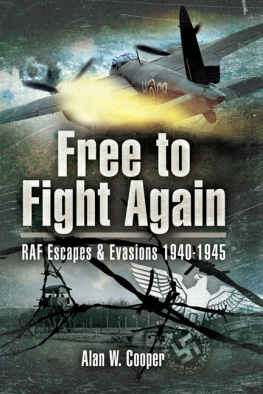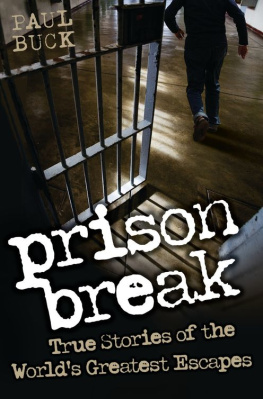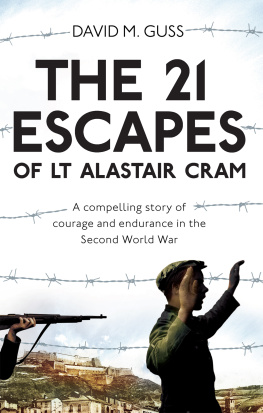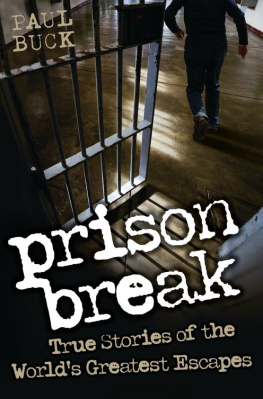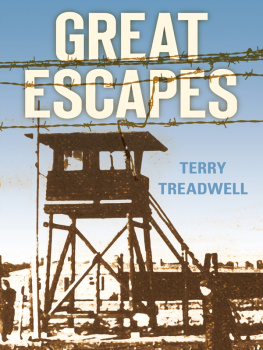Bibliography
Web Sites:

Books:
Colditz; P R Reid
Escape From Germany; Neil Hanson
Gunther Pluschow; Anton Rippon
First Edition 2013
Copyright 2013 G S Willmott
All rights are reserved. The material contained within this book is protected by copyright law, no part may be copied, reproduced, presented, stored, communicated or transmitted in any form by any means without prior written permission..
Willmott G S
Title: Escape - True Accounts of POW Escapes / Garry Willmott.
1st ed.
ISBN: 9781742983264 (ePub.)
Military History
Published by Garry Willmott
Digital edition published by
Port Campbell Press
www.portcampbellpress.com.au
Conversion by

Introduction
Wars are usually fought over territory, natural resources or religious differences whatever the reason they have created, changed or destroyed entire nations. The oldest profession in the world is the military the second oldest profession followed the armies on their conquests. War reaches back to the beginning of mankind although the first recorded war occurred in 2700 B.C. The belligerents were Sumer (in modern Iraq) and Elam (a region that is now part of Iran) This conflict was fought in the area around Basra in Iraq. Of course, tribes, cities, etc., had been fighting each other for thousands of years before that, but there are no written records of these earlier conflicts.
Prisoners of War (POW) helped establish and build nations such as Egypt, Rome, Athens and the Persian Empire. All these nations and cities rose or fell on the strength of their armies.
The dictionary definition of Prisoner of War is:
A prisoner of war (POW) enemy prisoner of war (EPW) or Missing-Captured is a person, whether combatant or non-combatant, who is held in custody by an enemy power during or immediately after an armed conflict.
The earliest recorded usage of the phrase is dated 1660.
For most of human history depending on the culture of the victors, combatants on the losing side in a battle could expect to be either slaughtered or enslaved.
The first Roman gladiators were prisoners of war and were named according to their ethnic roots such as Samnite, Thracian and the Gaul. Homers Iliad describes Greek and Trojan soldiers offering rewards of wealth to enemies who have defeated them on the battlefield in exchange for mercy, their offers were not always accepted.
In the later Middle Ages, a number of religious wars aimed to not only defeat but also eliminate their enemies. In Christian Europe, the extermination of the heretics or non-believers was considered their main objective. Examples include the 13th century Albigensian Crusade and the Northern Crusades. When asked by a Crusader how to distinguish between the Catholics and Cathars once theyd taken the city of Bziers, the Papal Legate Arnaud Amalric famously replied, Kill them all, God will know His own.
Likewise the inhabitants of conquered cities were frequently massacred during the Crusades against the Muslims in the 11th and 12th centuries. Noblemen could hope to be ransomed; their families would have to send to their captors large sums of money depending on their social status.
Many French prisoners of war were killed during the Battle of Agincourt in 1415. In feudal Japan there was no custom for ransoming prisoners of war, who were for the most part summarily executed
Every city or town that refused surrender and resisted the Mongols was subject to destruction
The Aztecs were constantly at war with neighbouring tribes and groups. The goal of this constant warfare was to collect live prisoners for sacrifice.
In pre-Islamic Arabia, upon capture, those captives not executed were made to beg for their subsistence. During the early reforms under Islam, Muhammad changed this custom and made it the responsibility of the Islamic government to provide food and clothing on a reasonable basis to captives, regardless of their religion.
The freeing of prisoners in particular was highly recommended as a charitable act.
Christians, who were captured during the Crusades, were usually either killed or sold into slavery if they could not pay a ransom.
After the Napoleonic wars between 1796 and 1797 a camp was built at Norman Cross near Peterborough in England to accommodate seven thousand French prisoners of war. This was the first purpose built POW camp; it was situated on a forty-acre tract of land. London was only 78 miles to the south by the Great North Road.
So began the era of escape.

Six prisoners escaped in April 1801. Three of them were caught at Boston, Lincolnshire and the remaining three were caught in a fishing boat off the Norfolk coast.
Three groups of 16 men each escaped in late 1801.
Incomplete tunnels were discovered in 1802.
After two major escape attempts in 1804 and 1807, the wooden stockade fence was replaced with a brick wall
One prisoner, Charles Francois Bourchier, stabbed a civilian Alexander Halliday while attempting to escape on 9 September 1808. He was convicted at the Huntingdon Assizes and sentenced to death by hanging. He was executed at the prison in front of the prisoners and the whole garrison
After the stabbing, the entire prison was searched and seven hundred daggers were found
In January 1812, a French prisoner was shot whilst escaping after he had overpowered a guard and stolen a bayonet.
Escape follows the adventures of some incredibly brave intelligent and determined men and women.
What drives a prisoner to risk punishment and sometimes death to escape from their captors and return home to their mother country only to re-enter the conflict putting their lives on the line once more.
Many POWs behaved themselves and as a result were treated reasonably with three meals a day, exercise and plenty of reading material. The Red Cross parcels supplied them with little luxuries like tobacco and chocolate. Officers were allowed beer and wine with their evening meal.
Those who chose to escape had a burning desire to rejoin the war and continue to serve their country.
We follow the adventures of Gunter Pluschow a German aviator who escaped Tsingtao a German post in China after it had been taken by the English and Japanese. His route took him to Japan, the United States and Gibraltar before being captured and interred in several POW camps in England. He was the first and only German to escape from an English camp in World War One.
On the opposing side William Leefe Robinson the first aviator to shoot down a German Zeppelin. He received a Victoria Cross for his gallantry. He was shot down over France and captured by the Germans. His treatment in the German camps including Colditz was atrocious.
The first American to escape from a German camp was Frank Zavicki a young Polish immigrant. His escape is quite amazing.
Horace Greasley a British soldier holds the record for the number of successful escapes, two hundred! Why? His lover Rosa would be able to answer that.
Escape also follows escapes from camps such as Holzminden, Colditz and Auschwitz.
While the human race exists there will be war, I wish that was not the case but the reality is John Lennons legendry song Imagine is a fantasy.

